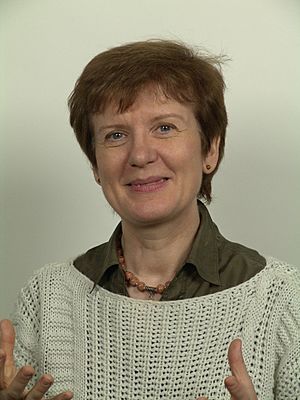Violeta Dinescu facts for kids
Violeta Dinescu, born on July 13, 1953, is a talented composer, pianist, and teacher from Romania. She has lived in Germany since 1982. Since 1986, she has been a professor at the University of Oldenburg, teaching people how to compose music.
Contents
Early Life and Education
Violeta Dinescu was born in Bucharest, Romania. She started her music studies in 1972. She attended the National University of Music Bucharest, where she focused on composition. Her teacher was Myriam Marbe.
In 1978, Violeta earned her master's degree with high honors. She also received special diplomas. These diplomas were for her skills in music composition, playing the piano, and teaching. After finishing her studies, she began teaching at the George Enescu Music School in Bucharest. She taught subjects like music history, how music makes us feel (aesthetics), counterpoint, harmony, and piano. In 1980, she became a member of the Romanian Composers Union.
Moving to Germany and Operas
In 1982, Violeta Dinescu moved to West Germany. She soon started creating operas, which are plays set to music. Her first opera was called Hunger und Durst. It was first performed in Freiburg in 1986.
She composed a children's opera in 1986. It was named Der 35. Mai after a book by Erich Kästner. Another opera, Eréndira, was created in 1992. It was based on a short story by Gabriel García Márquez. Her opera Schachnovelle (The Royal Game) was composed in 1994. These operas have been performed in famous opera houses. For example, Der 35. Mai was shown at the Staatsoper Hamburg in 2004. She also worked on music theater projects for the ARBOS theater in Austria. In 2005, her opera Herzriss premiered.
Teaching and Recognition
Since 1986, Violeta Dinescu has taught at several German music schools. These include academies in Heidelberg, Frankfurt, and Bayreuth. In 1996, she became a professor at the University of Oldenburg. There, she teaches "Applied Composition." This means she teaches students how to use their composition skills in real-world projects.
At the University of Oldenburg, she started a special event in 1996. It's called the Komponisten-Colloquium, where composers meet yearly. Famous composers like Jean-Luc Darbellay and Graham Waterhouse have attended. Since 1987, Dinescu has also been a leader in the International Alliance of Women in Music. Her musical works are published by well-known companies like Verlag Dohr and Schott Music.
Notable Musical Works
Violeta Dinescu is a very productive composer. She has created many pieces for orchestras, small groups of instruments (chamber music), choirs, and singers. She has won many international awards for her music.
Some of her important commissioned works include Akrostichon and L‘ORA X for orchestra. She also composed an oratorio for Pentecost, called Pfingstoratorium. An oratorio is a large musical piece for voices and orchestra, usually telling a story. She also wrote music for the silent film Tabu. Additionally, she composed two ballets, Der Kreisel and Effi Briest.
Here are some of her other works:
- Akanua, for piano, 1974
- Sonata, for violin or viola and piano, 1975
- In meinem Garten, for children’s chorus, 1980
- Mondnächte, for mezzo-soprano, saxophone, and percussion, 1986
- Der Kreisel, a ballet for orchestra, 1985
- Hunger und Durst, a chamber opera, 1985
- Concerto, for voice and orchestra, 1986
- Quatrain, for female voice, 1986
- Dona nobis pacem, for mezzo-soprano and cello, 1987
- Tabu, film music for a silent movie, 1988
- ICHTHYS, for violin, cello, and piano, 1991
- Der 35 Mai, a children’s opera, 1986
- Eréndira, a chamber opera, 1992
- Pfingstoratorium, for soloists, mixed chorus, and orchestra, 1993
- Schachnovelle, a chamber opera, 1994
- Self-Reflections I/II, for piano and live electronics, 1996–97
- Vortex – Wolken I, II und III, for small orchestra, 1998
- Licht-Bruch, for accordion, 2001
- Rugá, for clarinet, double bass, and accordion, 2001
- Herzriss, an opera for female voice and percussion, 2005
 | Chris Smalls |
 | Fred Hampton |
 | Ralph Abernathy |


